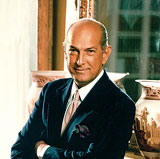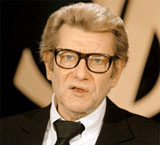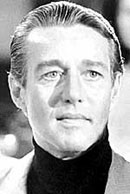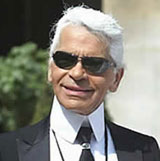影片對白 Andy, be serious. You are not trying. You are whining. What is it that you want me to say to you, huh?
我觀之我見 在這個片斷中 Miranda 和 Nigel 對于時尚和雜志本身的評論可謂是影片中精彩的兩個片段之一。這兩段評論在原書中是沒有的。
考考你 一展身手
文化面面觀
偉大的時裝設計師:Oscar de la Renta, Yves Saint Laurent, Halston, Karl Lagerfeld, Christian Lacroix
在這個電影片斷中,Miranda和Nigel都提到了幾位當代偉大的時裝設計師。下面就讓我們一起來認識一下他們。
Oscar de la Renta (1932-)
 Dominican-born U.S. fashion designer. After studies in Santo Domingo and Madrid, he became staff designer for Cristobal Balenciaga in Madrid. He moved to New York City in 1962 and started his own company to produce women's ready-to-wear fashions. In 1973 he founded Oscar de la Renta Couture and expanded into household linens, menswear, and perfumes. In the 1970s he introduced the ethnic look with "Gypsy" and Russian themes; more recently he has produced romantic evening clothes in taffeta, chiffon, velvet, brocade, and fur. From 1993 to 2002 he designed couture for the house of Pierre Balmain.
Dominican-born U.S. fashion designer. After studies in Santo Domingo and Madrid, he became staff designer for Cristobal Balenciaga in Madrid. He moved to New York City in 1962 and started his own company to produce women's ready-to-wear fashions. In 1973 he founded Oscar de la Renta Couture and expanded into household linens, menswear, and perfumes. In the 1970s he introduced the ethnic look with "Gypsy" and Russian themes; more recently he has produced romantic evening clothes in taffeta, chiffon, velvet, brocade, and fur. From 1993 to 2002 he designed couture for the house of Pierre Balmain.
Yves Saint Laurent (1936-)
 French fashion designer, born in Algeria as Yves Henri Donat Mathieu-Saint-Laurent. He established houses of couture and boutiques in Paris and New York. He was the foremost assistant to Christian Dior and became his successor as head of the House of Dior at the age of 21. His early collections were noted for their extreme, maverick quality. He opened his own Paris house in 1961, featuring the "chic beatnik" look; knitted turtlenecks; thigh-length boots; and short jackets. He revolutionized the fashion world by creating trousers and broad-shouldered suits that were images of power for women. His later designs include sophisticated tweed suits, the Mondrian dress, pleated skirts, updated peasant costumes, tuxedos for women, and heavy costume jewelry. His focus on an androgynous look was extremely influential in the fashion of the 1970s. He also designed for the Ballets de Roland Petit. By the mid-1970s, at the height of his success, his design empire included sweaters, neckties, eyeglass cases, linens, children's clothes, and fragrances. Gucci acquired his ready-to-wear and cosmetics divisions in 2000. Saint Laurent announced his retirement in 2002.
French fashion designer, born in Algeria as Yves Henri Donat Mathieu-Saint-Laurent. He established houses of couture and boutiques in Paris and New York. He was the foremost assistant to Christian Dior and became his successor as head of the House of Dior at the age of 21. His early collections were noted for their extreme, maverick quality. He opened his own Paris house in 1961, featuring the "chic beatnik" look; knitted turtlenecks; thigh-length boots; and short jackets. He revolutionized the fashion world by creating trousers and broad-shouldered suits that were images of power for women. His later designs include sophisticated tweed suits, the Mondrian dress, pleated skirts, updated peasant costumes, tuxedos for women, and heavy costume jewelry. His focus on an androgynous look was extremely influential in the fashion of the 1970s. He also designed for the Ballets de Roland Petit. By the mid-1970s, at the height of his success, his design empire included sweaters, neckties, eyeglass cases, linens, children's clothes, and fragrances. Gucci acquired his ready-to-wear and cosmetics divisions in 2000. Saint Laurent announced his retirement in 2002.
Halston (1932-90)
 American fashion designer, b. Des Moines, Iowa as Roy Halston Frowick; attended Indiana Univ. and the Art Institute of Chicago. In 1958 he moved to New York City, designing hats for Dilly Daché and later (1959-68) millinery and clothing for the fashionable Bergdorf Goodman department store. There he created several distinctive styles, most notably the pillbox hat for Jacqueline Kennedy. Opening his own salon in 1968, Halston became one of the most acclaimed designers of the 1970s, a favorite of movie stars, art-world denizens, and the general public, and a disco-era celebrity in his own right. His designs were classically simple, elegant, and chic. He introduced Ultrasuede, popularized the cashmere twinset, caftan, halter dress, shirtwaist, spiral skirt, and knee-length pants, and added perfumes and luggage to his label. He also designed costumes for the Martha Graham Ballet, Dance Theatre of Harlem, and various stage and film productions.
American fashion designer, b. Des Moines, Iowa as Roy Halston Frowick; attended Indiana Univ. and the Art Institute of Chicago. In 1958 he moved to New York City, designing hats for Dilly Daché and later (1959-68) millinery and clothing for the fashionable Bergdorf Goodman department store. There he created several distinctive styles, most notably the pillbox hat for Jacqueline Kennedy. Opening his own salon in 1968, Halston became one of the most acclaimed designers of the 1970s, a favorite of movie stars, art-world denizens, and the general public, and a disco-era celebrity in his own right. His designs were classically simple, elegant, and chic. He introduced Ultrasuede, popularized the cashmere twinset, caftan, halter dress, shirtwaist, spiral skirt, and knee-length pants, and added perfumes and luggage to his label. He also designed costumes for the Martha Graham Ballet, Dance Theatre of Harlem, and various stage and film productions.
Karl Lagerfeld (1938-)
 (Karl Otto Lagerfeld), German fashion designer. He won a fashion award at 16, designed for couturiers Pierre Balmain (1954-58) and Jean Patou (1958-63), then freelanced for Fendi, Krizia, and Valentino and designed for Chloé (1959-78; 1992-97). In 1982 he was appointed head designer at Chanel, where he revamped the classic Chanel suit into chic updated versions, using offbeat colors and such materials as denim and leather; reinvented the double C logo; accessorized with heaps of gold chain and pearls; and added such items as mini- and maxiskirts, hot pants, and lace-up biker boots to the house repertoire. The pony-tailed, sunglassed, fan-carrying Lagerfeld also has his own KL label (launched in 1984). His lines include neckties, shoes, perfumes, sunglasses, jewelry, and housewares. He is a skilled photographer as well, with several published volumes.
(Karl Otto Lagerfeld), German fashion designer. He won a fashion award at 16, designed for couturiers Pierre Balmain (1954-58) and Jean Patou (1958-63), then freelanced for Fendi, Krizia, and Valentino and designed for Chloé (1959-78; 1992-97). In 1982 he was appointed head designer at Chanel, where he revamped the classic Chanel suit into chic updated versions, using offbeat colors and such materials as denim and leather; reinvented the double C logo; accessorized with heaps of gold chain and pearls; and added such items as mini- and maxiskirts, hot pants, and lace-up biker boots to the house repertoire. The pony-tailed, sunglassed, fan-carrying Lagerfeld also has his own KL label (launched in 1984). His lines include neckties, shoes, perfumes, sunglasses, jewelry, and housewares. He is a skilled photographer as well, with several published volumes.